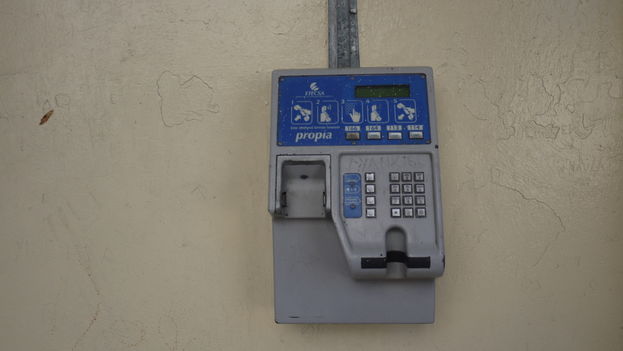
![]() 14ymedio, Generation Y, Yoani Sanchez, Havana, 30 September 2015 – “Nobody takes care of anything,” raged the lady in line at the cash register of a State butcher shop. She was referring to those who leave the refrigerators open or who put their shopping baskets on the glass counters. However, she didn’t seem to notice the lack of air conditioning, the stench coming from some of the freezers where the goods were spoiled, or the single employee taking payments, while the others looked on with their arms crossed. The customers are to blame, according to the feisty woman.
14ymedio, Generation Y, Yoani Sanchez, Havana, 30 September 2015 – “Nobody takes care of anything,” raged the lady in line at the cash register of a State butcher shop. She was referring to those who leave the refrigerators open or who put their shopping baskets on the glass counters. However, she didn’t seem to notice the lack of air conditioning, the stench coming from some of the freezers where the goods were spoiled, or the single employee taking payments, while the others looked on with their arms crossed. The customers are to blame, according to the feisty woman.
Social indiscipline has become a recurring theme in reports and interviews in the national media. Vandalism is blamed for everything, from problems with public transport buses to the deplorable state of planted areas. Official journalists raise the accusing finger more and more against the pillage, while barely addressing the educational and political system that has molded these citizens so bent on looting and destruction.
Social behavior is shaped by one’s environment. On a spotless floor, a clean sidewalk, in a cared-for city, many will imitate the environment and avoid dirtying, destroying or degrading it. Context greatly influences people’s attitude toward public spaces and common goods. But when the environment is dirty, assaulted by carelessness and becomes hostile, those who inhabit it will neither respect nor care for it.
Cubans are no more unruly than other human beings and yet, right now, a park filled with children’s play structures needs to be guarded like a bank, so that the swing seats, the iron from the carousels or the ropes from the climbing nets aren’t stolen. In poorly lit areas of the city people defecate or urinate, microdumps rise in thousands of corners and a stream of dirty water can fall from any balcony, directly on pedestrians below.
When the environment is dirty, assaulted by carelessness and becomes hostile, and those who inhabit it will neither respect nor care for it
The situation has gone on for so long that many have come to believe that it is in the DNA of our identity to not care for our surroundings. “This city couldn’t have a subway, because imagine the stink in those tunnels with people taking care of all their needs down there,” states a gentleman with the tint of a shabby official, while waiting at a bus stop.
With his words, the man suggested that we Cubans cannot enjoy the privileges of modernity and comfort, because we are unable to maintain them. However, this same “unredeemable exterminator” that we have become can get on a plane, go to New York or Berlin, and in two weeks in those place be throwing trash in the bins, not lighting up in public places, and cleaning the mud off their shoes before entering an office.
Vandalism is a problem present in all societies. Laws and control regulate it and keep it in check, but there it is. It is a part of our human nature that a moment of rage makes us take a blade and inscribe our name on a recently painted wall, or rip the fabric of a movie theater seat. Fines and other penalties should keep this vulture we all shelter within us from getting out of hand.
However, the context has to encourage people to care for things. It is not enough to call for discipline and formal education, the individual has to feel that it’s worth the trouble to preserve his or her surroundings. A street full of potholes, a late and overloaded bus, a sidewalk plunged into darkness, its single streetlight broken years ago, are the ideal components for depredation and pillage.
Many, like the lady who complained at the butcher’s, no longer perceive the scenario of constant attacks on the rights of consumers and citizens that our society presents. So accustomed to the abuse, the inefficiencies, the breakage and the high prices, they throw all the blame on those “unruly Cubans” who couldn’t “live anywhere without destroying it.”
